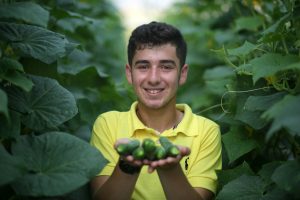Youth comprise over one-third of the Palestinian population, an equivalent of 1.37 million individuals ranging between the ages of 15 and 29. This vibrant population is always in search of new economic opportunities. Fifty-two percent of these young people reside in rural areas of the West Bank, where few jobs are created and where agriculture is not only an integral part of the socio-economic and cultural fabric but also a potential driver of economic development and an unexplored arena of opportunities for young people.
Youth unemployment in the West Bank has increased over the past years, going from 25.6 percent in 2007 to 27.2 percent in 2018. In Gaza, the rate of unemployment went from 39.8 percent to 69 percent during the same period.* Agriculture has an unharnessed potential to provide decent employment opportunities for these youth, not only through farming but also through various other related businesses such as processing, packaging, transportation, distribution, marketing, and financial services.

Youth involvement in the agricultural sector would substantially enhance its productivity and profitability, allowing it to realize its potential as a driver for rural development in Palestine. Moreover, young agri-entrepreneurs are crucial to introducing and harnessing the much-needed innovations and technological advances in Palestine’s agricultural value chains. However, even when young Palestinians perceive that agricultural activities are a route to entrepreneurship and economic independence, they still face multiple challenges and barriers to entry that include difficulty in accessing land and capital for starting their businesses, limited information, and various market constraints.

Denmark, Netherlands, European Union, Switzerland, and Spain, through the Food and Agriculture Organization of the United Nations (FAO) and the Palestinian Ministry of Agriculture, are offering new opportunities for youth entrepreneurship along agricultural value chains through a Multi-donor Agribusiness Programme (MAP) that supports young agri-entrepreneurs to establish, run, and sustain agri-food investments. This program puts special attention on assuring equal opportunities to all, promoting competitiveness within a gender-sensitive, open, and transparent framework.

Support will range from investment development to provision of financial assistance. According to Ciro Fiorillo, head of the FAO office in the West Bank and Gaza Strip, the investment support under the MAP will provide a unique opportunity to groom young entrepreneurs and promote agri-business growth. He explains, “By addressing specific barriers to market entry, the MAP provides a pro-youth, private-sector-led approach to capturing agri-food business opportunities and stimulate value-chain development.”
Through MAP and many other initiatives that promote investment support, policy assistance, technical capacity building, and awareness raising, Palestinian and European partners are seeking to develop a strong enabling environment in which young people can thrive and seize decent current and future employment opportunities in agricultural value chains.
Photo courtesy of the author.


